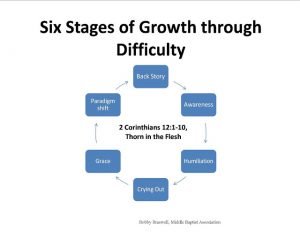The apostle Paul's missionary imprint was on Corinth. But in his correspondence with them after his departure, it surfaces that people had disparaged him and questioned his authority. His response to them is a masterpiece in understanding how to make progress in Christian maturity through challenging circumstances. I found it helpful to identify six stages Paul passed through in his narrative about a vision of heaven and his subsequent thorn in the flesh (2 Corinthians 12:1-10).
Paul had a vision that might be characterized as a near-death experience (Acts 14:19). He described it as "being caught up into paradise" where he heard "inexpressible words, which a human being is not allowed to speak." It's interesting because today if someone had that experience, they would get a book deal and Christian film produced out of it, with accompanying Bible study curriculum. Paul relates it to them as a way of reasserting his apostolic privilege and authority, but he told it in the third person as a way of accentuating his unwillingness to blow them out of the water.
As Paul understood it the extraordinary privilege of this heavenly vision put him at risk for having an out of control ego, so God allowed the circumstances of his life to humble him. God puts an incredible value on humility (1 Peter 5:5-7, James 5:6-10, Proverbs 3:34). In these verses we can see that:
God gave Paul a "thorn in the flesh, a messenger of Satan to buffet" him. People often query, "What was Paul's thorn in the flesh?" we know that:
Paul pleaded with the Lord three times that it would leave him. Is three a hard number, or is he saying that he repeatedly cried out for deliverance? Either way, God didn't answer his prayer the way he hoped. Christine Dente, a popular Christian vocalist, writes about her experience with chronic pain: "A true miracle for me, though, is when I surrender to the suffering and my suffering reveals itself as a blessing. God sometimes comes through for me by shifting my perspective. When the situation has not changed but my heart sees it in a different light, I realize that the change I have been searching for is taking place within me."
So, even though God hasn't changed our circumstances, often He is changing us.
In grace we find an answer better than the one we hoped for. "My grace is sufficient for you, for my power is perfected in weakness" (2 Corinthians 12:9). Everyone will wrestle with seemingly unassailable loose ends – some tangled area of complexity that never seems to find resolution. But good news! As Michael Card put it, "God's name is Redeemer, and He doesn't waste anything." If we cooperate, our broken places become the cracks that allow grace to seep in.
"Therefore I will most gladly boast all the more about my weaknesses, so that Christ's power may reside in me. So I will take pleasure in weaknesses, insults, hardships, persecutions, and in difficulties, for the sake of Christ. For when I am weak, then I am strong" (2 Corinthians 12:9).
2. What Paul is saying:
Have you ever wanted to smack someone over the head for saying, "God will never put more on you than you can handle?" The truth is, life will often introduce pressures and challenges that do exceed our human limitations. But the hopeful truth is that while God may never answer our prayer for deliverance in exactly the manner we desired, He will never leave us or forsake us. Our struggle can be the very portal into grace.